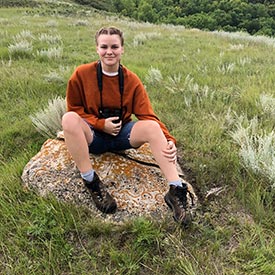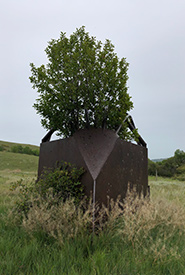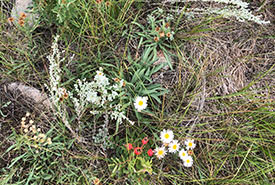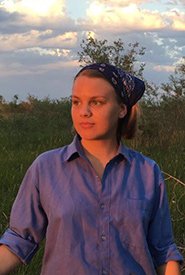I like to be outnumbered

Maia Herriot in the field (Photo by NCC)
In my last week at the Nature Conservancy of Canada (NCC) as the communications intern for the Saskatchewan Region, I found myself standing on a hill, in the rain, on one of our Qu’Appelle Valley properties. I was looking through my binoculars, trying to find wetlands for better birding down in the valley. I’m not a serious birder, and I don’t always put my findings in eBird. But I do play a game with myself of counting visible and audible animals when I’m alone in nature, just as an acknowledgement of being outnumbered.
This practice reminds me that however high humans are on the food chain, however much our industrial and personal activities disproportionately shape the lives of other animals, the animals have us outnumbered. I find that idea very comforting.
With between 200 and 400 billion birds worldwide, to our measly 7.7 billion people, we are probably outnumbered every time we step outside. But sometimes it takes driving out of the city and standing on a hill to really feel it. For me, it feels like reassurance. We 7.7 billion have a lot of power — to do good or do ill — for the animals we share this Earth with.
Related blog posts
So, for me, recognizing how many more of them there are than us is humbling and reminds me that issues like the conservation of their habitat takes clear precedence over whatever my personal stakes (as a human and a consumer) are. Other animals have us outnumbered, and they should. We should ensure that they continue to.

On another NCC property I went to that day, there were several trees that had grown straight through the middle of abandoned farm equipment. (Photo by NCC)
On another NCC property I went to that day, there were several trees that had grown straight through the middle of abandoned farm equipment. The plants outnumber us too. They grow in adversity, wherever they can. Nature always tries to persevere. Most of the time, all we need to do is get out of the way. So often now, the natural world is forced to bend to our needs or work around us. I hope for a future where we grow around the needs of the natural world, which are already so often tied to our own basic needs.
When I’m living in Regina for the summer in a house with a ratio of three people to one dog, individual people problems can feel more important than communal, animal ones. Better prioritization is important to our future: we need clean air, clean water and a healthy habitat for animals and us before anything else. Only after we work toward those goals together can we worry about ourselves.

Plants at Fairy Hill, SK (Photo by NCC)
I’ve been outnumbered here in NCC’s Regina office all summer — a lone bachelors of arts pursuer in a sea of conservation science majors and land management experts. Leaning into this imbalance did the same thing to me as it does when I’m up on a hill listening for birds: it humbled me and reminded me of why conservation work is so important in our world right now. Today we need to save the grasslands.
I want a future where a person can still walk out into native grassland and find 12 mourning doves, one raven, one blue jay, two crows, possibly two great blue herons (or just the same one twice), one house wren, one catbird, two song sparrows, three red-tailed hawks, six mallards, five Swainson’s hawks, two eastern phoebes, one vesper sparrow, one turkey vulture, one merlin, one bald eagle, one pied-billed grebe, one cormorant…and only one human.
The natural world is bigger than us. We need to remember that it is, and let it remain so.


